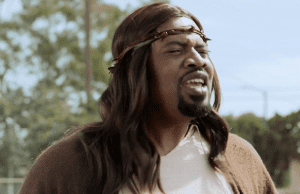 The season finale of Cartoon Network’s Black Jesus aired a few days ago Oct. 9, and the A.V. Club marveled about how strangely uncontroversial the show was. “Nothing ever really feels important enough to get anyone on this show to put their joint down, let alone protest,” writes Eric Thurm, adding the program is “inoffensive, easygoing and responsible” (his emphasis, not mine).
The season finale of Cartoon Network’s Black Jesus aired a few days ago Oct. 9, and the A.V. Club marveled about how strangely uncontroversial the show was. “Nothing ever really feels important enough to get anyone on this show to put their joint down, let alone protest,” writes Eric Thurm, adding the program is “inoffensive, easygoing and responsible” (his emphasis, not mine).
Well, I’d not go that far. It’s true that Black Jesus didn’t generate the sort of controversy that some had thought (and perhaps its creators had hoped). It’s also true that Black Jesus, despite the presence of a swearing, toking Christ figure, isn’t as blasphemous as it could’ve been. The Jesus in Black Jesus takes love very seriously, and that can be gratifying. From my Plugged In review:
When he wakes up a drunk named Lloyd, the homeless guy says, “Jesus, you smell like s—.” Then Lloyd pauses and says, “Maybe that’s me.” And he passes out again. Jesus’ response? “I love you so much, Lloyd,” he says with both sincerity and weary exasperation—which is kind of the way I picture the real Jesus talking to us in our not-so-great moments.
But I also wonder if Christians aren’t as prone to pick up the picket signs as they once were.
When I was a kid in 1988, I remember picketers standing in front of movie theaters showing Martin Scorsese’s The Last Temptation of Christ—a Jesus who deals with temptations and some ungodly emotions. Christians picketed theaters across the country (and even the home of Lew Wasserman, whose company MCA was ultimately behind the release). It wasn’t the first, or last, bit of entertainment to spawn a huge and heated backlash.
But it seems those culture-grabbing Christian backlashes are becoming more infrequent. Black Jesus didn’t stir nearly the interest on Plugged In that, say, Noah did earlier this year. And while plenty of Christians disliked Noah, I didn’t see anyone picket it.
Why the lack of fiery condemnations? I believe there are at least three interrelated reasons in play—not one of which is that entertainment is becoming more controversial.
First, it’s often ineffective. Those who create media—movies, television shows, music, etc.—are unlikely to curb critiques of the Christian Church just because said Church demands it. And because Christians (particularly conservative Christians) don’t have the cultural capital that perhaps they once did, it’s unlikely that many entertainment consumers will steer away from such entertainment just because a given pastor wants them to.
Second, it can be counterproductive. The more we scream about how awful something is and how no one with any common decency should dare see it, the more it stirs curiosity. Indeed, some movies actively court controversy to gin up ticket sales. In 2012, Richard Lawson at The Wire points to Quentin Tarantino’s super-violent Django Unchained as an example. “He’s [Tarantino] not really trying to incite serious debate here—the film isn’t really that intellectually ambitious—but a good pooh-poohing from Spike Lee and people like Matt Drudge will, if paid attention to, likely do nothing but pique audiences’ interest.” The Passon of the Christ arguably ginned up some additional ticket sales because of some of the chatter surrounding its violence and supposedly anti-Semitic themes.
And third, we Christians are changing. It’s always dangerous to generalize, of course, but I think as a new generation of Christians supplants the older, I’m seeing a greater willingness to open up dialogue than plant ourselves on an ideological hill. Young Christians may hate Noah as much as their parents do (my daughter loathed the movie), but they’re more willing to see it so they can talk about it with their friends.
It’s an interesting dynamic in play and, from my perspective, a mostly healthy one—particularly as Christians increasingly walk in a “post-Christian” world. There are dangers in this softer approach, of course: Christians, instead of changing the culture in positive ways, may instead be changed by that culture. To keep our principles and values requires greater vigilance and intentionality. But ultimately, I think it’s the way to go.













